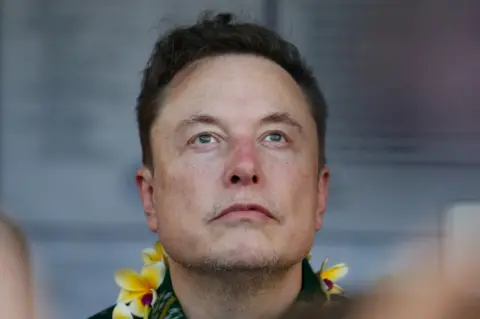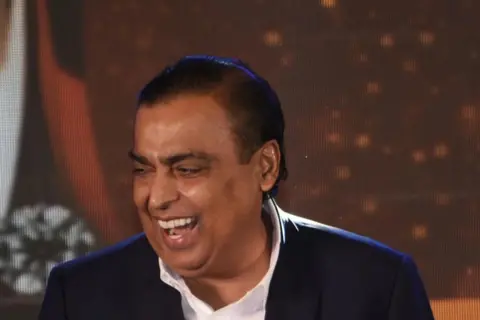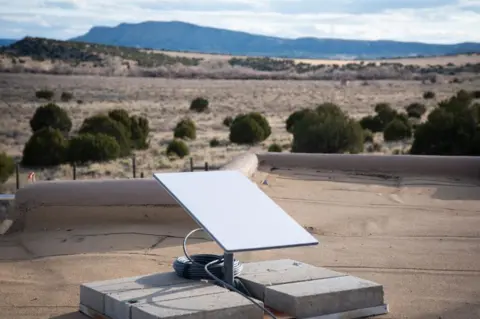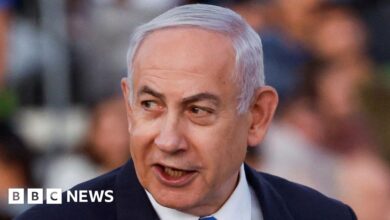Elon Musk battles Mukesh Ambani over India’s satellite internet

 Reuters
ReutersThe race between the world’s two richest men, Elon Musk and Mukesh Ambani, is intensifying as they prepare to go head-to-head in the Indian satellite broadband market.
After the Indian government announced last week that satellite spectrum for broadband would be allocated administratively rather than through auction, this battle has only heated up.
Mr. Musk has previously criticized the auction model supported by Mr. Ambani.
Satellite broadband provides internet access anywhere within satellite coverage.
This makes it a reliable choice for remote or rural areas where traditional services such as DSL – a connection that uses phone lines to transmit data – or cable are not available. It also helps bridge the hard-to-reach digital divide.
India’s telecom regulator is yet to announce spectrum pricing and commercial satellite internet services are yet to start.
However, according to credit rating agency ICRA, the number of satellite internet subscribers in India is expected to reach two million by 2025.
The market is highly competitive, with about half a dozen key players, led by Mr. Ambani’s Reliance Jio.
After investing billions in airwave auctions to dominate the telecom sector, Jio has now partnered with Luxembourg-based SES Astra, a leading satellite operator.
Unlike Mr. Musk’s Starlink, which uses low Earth orbit (LEO) satellites placed 160 to 1,000 kilometers above the Earth’s surface for faster service, SES operates Earth orbit satellites. medium land (MEO) at much higher altitudes, providing greater cost efficiency. system.
Receivers on the ground receive the satellite signal and process it into internet data.
Mr. Musk’s Starlink has 6,419 satellites in orbit and 4 million subscribers in 100 countries. He was aims to launch the service in India from 2021but legal hurdles have caused delays.
Many people believe that if his company enters India this time, it will boost Prime Minister Narendra Modi’s efforts to attract foreign investment.
It will also help his government’s efforts to burnish its pro-business image, countering claims that its policies favor top Indian businessmen like Mr. Ambani.
 Getty Images
Getty ImagesWhile auctions have proved lucrative for it in the past, The Indian government defended this administrative decision to allocate satellite spectrum, saying it was in line with international standards.
Gareth Owen, technology analyst at Counterpoint Research, said satellite spectrum is not typically allocated through auction because the costs involved can outweigh financial reasons or investments in the business. Administrative allocation, in turn, will ensure spectrum is distributed fairly among “qualified” players, giving Starlink an opportunity to enter the race.
However, Mr. Ambani’s Reliance believes that an auction is needed to ensure fair competition, as India lacks clear legal regulations on how to provide satellite broadband services directly to people.
In letters written to the telecommunications regulator in early October, seen by the BBC, Reliance repeatedly called for a “level playing field between terrestrial and satellite-based access services”.
The company also said that “recent advances in satellite technology… have significantly blurred the lines between satellite and terrestrial networks” and that “satellite-based services are no longer limited limited to areas without terrestrial networks”. A letter states that spectrum allocation is done through auction as per India’s telecom laws, with administrative allocation allowed only in cases of “public interest, government function or technical or economic reasons prevent an auction”.
Regarding X, Mr. Musk pointed out that the spectrum “has long been designated by the ITU as shared spectrum for satellites.” The International Telecommunications Union (ITU), a United Nations agency on digital technology, sets global regulations and India is a member and signatory.
When Reuters news agency reported that Mukesh Ambani had lobby the government to reconsider his position, Mr. Musk replied to a post on X, saying: “I’ll call [Mr Ambani] and asked if it would be too much of a hassle to allow Starlink to compete to provide Internet services to Indians.”
Mr. Owen said that Ambani’s opposition to the administrative pricing method may stem from strategic advantage. The tycoon, he said, may be “prepared to outbid Musk,” using an auction to potentially knock Starlink out of the Indian market.
 Getty Images
Getty ImagesBut Mr. Ambani is not the only one who supports the auction route.
Sunil Mittal, chairman of Bharti Airtel, has said that companies wanting to serve upscale, urban customers should “get a telecom license and buy spectrum like everyone else”.
Mr. Mittal – India’s second largest wireless network operator – together with Mr. Ambani, controls 80% of the country’s telecommunications market.
Such resistance is a “defensive move to increase costs for international companies seen as a long-term threat,” said Mahesh Uppal, a telecommunications expert.
“While there is no immediate competition, satellite technology is evolving rapidly. Telecommunications company [in India] with large terrestrial businesses concerned that satellite could soon become more competitive, challenging their dominance.”
Clearly, the promise of the large Indian market is at stake. According to EY-Parthenon, a consulting firm, nearly 40% of India’s 1.4 billion people still do not have internet access, with rural areas accounting for the majority of cases.
For context, China is home to nearly 1.09 billion Internet users, nearly 340 million more than India. 751 millionaccording to DataReportal, which tracks global online trends.
India’s internet penetration still lags behind the global average of 66.2% but recent studies show the country is closing the gap.
If priced properly, satellite broadband can help bridge some of this gap and even help in internet of things (IoT), the network that connects everyday objects to the internet, allowing them to talk to each other.
Pricing will be important in India, where mobile data is among the cheapest in the world – just 12 cents per gigabyteaccording to Mr. Modi.
“Price war [with Indian operators] is unavoidable. Musk has deep pockets. There’s no reason he couldn’t offer a year of free service within [some] place to gain a foothold in the domestic market,” said Prasanto K Roy, technology analyst.
Starlink has reduced prices in Kenya and South Africa.
 AFP
AFPIt may not be easy though. In 2023 reportEY-Parthenon notes that Starlink’s higher costs – nearly 10 times those of major Indian broadband providers – could make it difficult to compete without government subsidies.
More LEO satellites – the type of satellites that Starlink operates – are needed to provide global coverage compared to MEO satellites, increasing launch and maintenance costs.
And some of the concerns of Indian operators may be unfounded.
“Businesses will never switch completely to satellite unless there is no terrestrial option. Terrestrial networks will always be cheaper than satellite, except in sparsely populated areas,” Mr Owen said. .
Mr. Musk may have a first-mover advantage, but “the satellite market is notoriously slow to develop.”
The war between the two richest men in the world in the space Internet has really begun.





